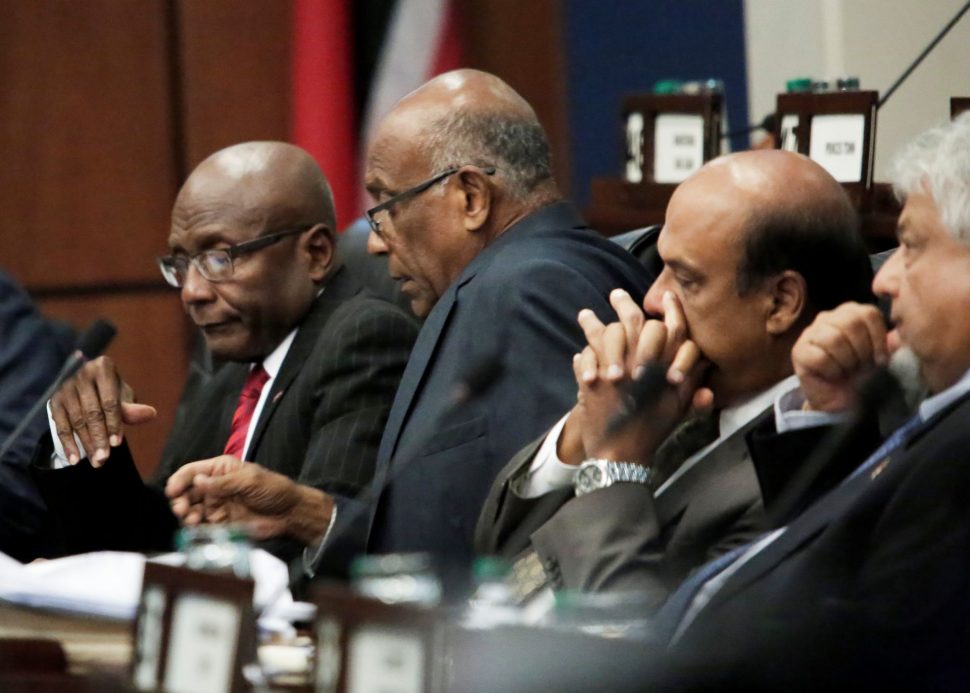(Trinidad Guardian) A major boost in the police’s anti-crime arsenal is expected to unfold following Wednesday night’s passage of the Bail (Amendment) Bill which was surprisingly supported by the Opposition.
Both sides from the House of Representatives came together in a rare show of unity to pass the legislation.
It was passed around 7.25 pm by a total of 32 votes — 22 Government MPs and 10 UNC MPs present.
The positive outcome came during the final stage of Wednesday’s special Parliament sitting to debate the bill – and after several days of lobbying by Government to sway public support.
The government had called Parliament out of recess to debate the bill.
At the height of the recent crime crisis, the Police Service had requested the seven clause bill to lock away repeat offenders blamed for the sudden spike in gang-related murders. The provision of the legislation restricts bail for 120 days if someone has a conviction for serious offences and is charged for one of them again. Bail will also be restricted if someone is charged for a serious offence, is out on bail and gets charged for the same category of offence.
Offences include those which carry a penalty of 10 years’ jail concerning the Offences Against the Person Act, Dangerous Drugs Act, Kidnapping Act, Sexual Offences (against child) Act, Sexual Offences Act, Anti-Terrorism, Trafficking in Persons and Firearms Acts. Culprits will have to prove “exceptional circumstances” where they feel should get bail.
The bill was passed without amendments although the Opposition had presented eight amendments. These were rejected by the Government. Attorney General Faris Al-Rawi told Guardian Media after the debate, that he was taking steps to have the bill proclaimed as law “immediately. The case the Government brought for this bill was unassailable.”
UNC deputy leader David Lee said, “We now want to see – in the shortest possible time – the results of this piece of legislation we’ve given Government.”
The development was an about-face for the Opposition which had refused to support the bill when it was presented in the Upper House in June. Then, it was passed only with Government and Independent senators’ votes.
On Monday, however, the Opposition signaled a softening of position and that the “door wasn’t closed” on the bill.
Last night, the 10 UNC MPs who voted for the bill included UNC’s Lee, Rodney Charles, Suruj Rambachan, Fazal Karim, Bhoe Tewarie, Christine Newallo-Hosein, Vidya Guyadeen-Gopeesingh, Rudy Indarsingh, Ramona Ramdial and Ganga Singh.
During the debate, Charles had said the UNC supported the bill in principle but had significant reservations on it. He had proposed some of Opposition’s eight amendments.
Singh’s contribution also hinted at Opposition support. He had acknowledged that the reason MPs were called out of vacation to deal with the legislation was because of despair, hopelessness and resignation in society.
He congratulated National Security Minister Stuart Young’s presentation on the bill, noting Young said he wasn’t casting aspersions on anyone and had admitted the bill was “no silver bullet” on crime.
Singh said T&T has had a “harvest of lead” (bullets) and bodies and MPs had to consider what to do and “…do our duty as legislators on what’s best for T&T.”
He said in the political arena it was necessary to have collaboration and compromise for the national interest. “I always believe in that,” he added.
Singh said that in order to deal with the tangible despair “out there” and bring about the necessary change “we must first change the way we approach (things) and the atmosphere between both sides in Parliament sittings and the whole agenda must be one in which we move away from asymmetry to symmetry and a level of commonality.”
Singh’s position was lauded by Al-Rawi. The AG, however, rejected the UNC’s proposed amendment for a one-year sunset clause instead of the three-year sunset clause Government had proposed.
The three-year sunset clause means the bill – after being proclaimed – will be in force for three years.
Al-Rawi said Government needed to have the three years to operationalise the law and the fight against criminality couldn’t be interrupted by a one-year sunset clause. He added it was impractical in an election year to have the one-year sunset clause.
The Attorney General also rejected the UNC’s proposal for a review of the bill’s impact every six months. He said the Opposition has five opportunities to get such information including from police units, Freedom of Information questions to the police and questions in Parliament.
The House of Representatives has adjourned for recess again. Parliament is expected to resume in early September.





